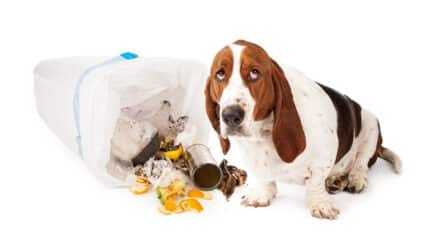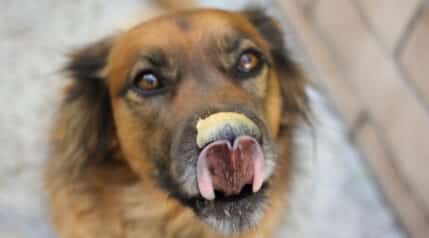There is a wealth of information on the internet about canine nutrition and the best foods for your dog. Frustratingly, a lot of the advice is conflicting.
Many advocate a more natural diet for our canine friends, moving away from the widely available dry foods. However, does ‘natural’ always equate to ‘safe’?
Let’s explore the slightly controversial question, ‘can dogs eat bones?
Can Dogs Eat Bones?

There is no easy answer to this question. It depends on many things, including the bone size, the animal it came from, whether it’s cooked or raw, the size of your dog and whether they have any underlying medical conditions.
A more pertinent question might be ‘should a dog eat bones?’. The majority of vets have experienced dogs with serious illness or injury due to eating bones. Of course, many dogs can eat bones without issue. As pet parents, we must decide whether the benefits outweigh the risks and if there are safer alternatives.
There is no best bone for dogs to chew, and most vets feel the risks outweigh the benefits, especially when you can get the advantages through safer options.
Are Boiled Bones Safe for Dogs?
It’s important to note early on that dogs should never be fed cooked bones. Bones soften when cooked, meaning they break and splinter into sharp pieces more easily. This leads to a higher risk of damage along the gut or getting stuck and causing a blockage.
So boiled bones, bones from pork roast, bones from cooked steak, or bones that are pressure cooked should all be off the table.
What Happens If a Dog Eats a Bone?

Sometimes, nothing at all. Many dogs are being fed raw bones with no problems. However, some serious risks come with eating bones, and dogs can become seriously ill.
Here are the possible risks:
- Broken or damaged teeth. Bones can be very hard. With time, teeth can become worn down to the point that the pulp is exposed. This is the part of the tooth containing the nerves, meaning toothache for your pup. Teeth can also break or fracture when chewing on something too hard. A broken tooth is extremely painful, so an anesthetic and surgical treatment are needed.
- Injuries in the mouth. Sharp pieces of bone can cut the tongue, cheeks, roof of the mouth, or lips. They can even cause puncture wounds, which can cause abscesses.
- Lodged bones. Pieces of bone that break off commonly become lodged on the roof of the mouth. Bones can also become stuck on the lower jaw. When either of these happens, your dog will likely require sedation or general anesthetic to remove the lodged bone piece safely.
- Choking. Small pieces of bone can pose a choking hazard if they go down the wrong way. Not impossible to imagine in an excitable pup.
- Bacteria. Raw bones can carry bacteria, such as E. coli and Salmonella. These can cause food poisoning, meaning a nasty bout of sickness and diarrhea for your pup. Even if they don’t make your dog poorly, your dog can carry and pass on the bacteria to you and your family. No amount of food preparation hygiene can remove the fact that your pup likely shares your sofa, sleeps on the bed, and likes to dish out kisses in the form of licking. So raw bones can pose a safety risk to the household too.
- Blockage. Bones can easily become lodged or stuck in the stomach or intestines. This is an emergency; your dog needs a general anesthetic and emergency surgery to remove the bones. Sadly, it can even be fatal, especially if the bone punctures the stomach or intestine. This allows gut contents to leak into the abdomen, causing severe infection and inflammation called peritonitis.
- Constipation. Eating too many bones or pieces that get lodged in the colon and rectum (the last portion of the gut) can cause constipation. Most vets also have had to perform enemas on dogs due to a buildup of bone fragments in the colon and rectum. Again, this requires a general anesthetic.
Can Bones Be Good For Dogs?
Many people swear by the benefits of bones for dogs, but, honestly it requires a risk-benefit analysis. Let’s look at whether bones are good for dogs:
Nutritional Benefit
Much of a bones nutritional value comes from the surrounding structures such as the meat, bone marrow, and cartilage. The bone itself can be a good source of calcium and phosphorous.
However, all good quality commercial complete diets (wet, dry, or raw) are specifically formulated to contain all the nutrients your dog needs. So, your dog doesn’t need bones for the added nutrients, and in fact, supplementing their diet can cause dangerous excesses of some nutrients.
If you are keen on the nutritional benefit of bones, ground-up bones can be a safer alternative.
Chewing Action
Canines naturally love to chew, and it’s good for both mental and physical stimulation. Chewing can also help keep teeth clean and stimulate saliva production, which is good for oral health.
However, there are many safer products on the market which have the same effect. Cleaning your dog’s teeth daily is the gold standard for dental care. If your dog doesn’t allow this, look for dental toys and chews approved by the Veterinary Oral Health Council (VOHC).
Frequently Asked Questions

So, now you know the risks and can make an informed decision about whether you choose bones as a treat for your pup.
Can a Dog Digest a Bone? Will it Dissolve in a Dog’s Stomach?
Dogs can digest some bone. However, larger pieces of bone usually pass through the stomach before they are fully digested. Sharp bone fragments can also damage the stomach wall, even if small.
How Long Does It Take for a Dog to Pass a Bone?
The length of time depends on the size and type of bone, whether it’s cooked or raw, your dog’s size, and if parts are lodged, among other considerations.
If your dog has accidentally eaten some bone or you are worried about your dog after they’ve had a bone as a treat, you should call your veterinarian for advice right away. The sooner the problem is treated, often the better the outcome.
At What Age Can Dogs Eat Bones?
You shouldn’t give bones to a puppy before they have all of their adult teeth. This is usually around six months of age. Before this, their teeth and jaw muscles were not strong enough to chew on anything too hard. They are also at higher risk of choking and swallowing inappropriate bits. Choose puppy-safe chew toys to help with teething instead. You can even place them in the fridge for cooling comfort.
Which Bones Are Safe for Dogs?
Sadly, no bone is guaranteed to be safe for dogs. All bones carry some risk. If you do choose to feed bones to your dog, here are some tips:
- Never feed your dog cooked bones of any type.
- Always supervise your dog when chewing a bone and remove it immediately if the bone breaks.
- Choose a bone size appropriate for your dog. Large bones are less likely to break.
- Don’t feed bones to your dog if they have underlying gut issues such as a sensitive gut, IBD (inflammatory bowel disease), or are prone to pancreatitis.
- Avoid chicken, pork, or turkey bones, which are more likely to break and cause issues.
- Remove the bone once your dog has finished chewing and dispose of it safely.
- Frozen bones are not advisable, as they are too hard for your dog’s teeth.
- Don’t feed your dog bones more than once a week, or else they may cause constipation.
It’s important to note that most vets don’t recommend bones at all; safer alternatives are available.
How Bad Are Chicken Bones for Dogs?
Chicken bones are dangerous for dogs, as they are soft and break or splinter easily. This is especially true of cooked chicken bones. They are also small, so more likely to become lodged or stuck somewhere. You should avoid chicken bones.
Can I Give My Dog a Beef Rib Bone?
Beef rib bones tend to be larger and stronger than other types of bone, so less likely to break and splinter. As long as they are raw and large enough for the size of your dog but not too large or hard for their teeth, then you could consider offering a beef rib bone to your dog as a treat. Remember, however, although safer than other types of bone, they are not without risk.
What Do Vets Recommend For Dog Chews?
Each vet has their own preference and experience of different dog chews. Looking for chews approved by the Veterinary Oral Health Council (VOHC) is always a good start. These VIRBAC Dental Chews are one of our favorites. Many veterinary practices actually sell dog chews. So, if you aren’t sure which is the best dog chew for your dog, ask your veterinary team. They can advise on chews suitable for your dog’s age, size, and health.
Final Thoughts
There is no easy answer to the question of whether dogs can eat bones. Whether they should eat bones is a more important question. Many vets agree that they shouldn’t, based on a risk-benefit analysis.
If you decide to feed your dog bones, make sure you follow the safety rules and always seek immediate veterinary advice if you have any concerns. If you’ve decided that bones aren’t for you and your pup, then there are plenty of safer alternatives available to fulfill your dog’s natural desire to chew.





